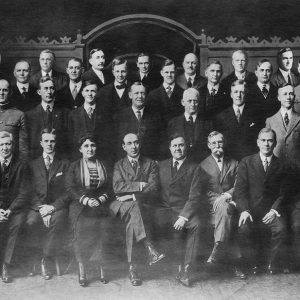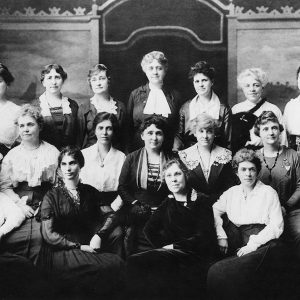calsfoundation@cals.org
Arkansas Council of Defense
The Arkansas Council of Defense was the governor-appointed group tasked with coordinating propaganda and promoting activities in the state to support the war effort during World War I.
Congress created the Council of National Defense in August 1916 to advise the president and other national leaders on how to coordinate the United States’ resources during a time of war. When the United States declared war on Germany on April 6, 1917, Governor Charles Hillman Brough created the Arkansas Council of Defense and appointed a dozen men to the council; the group would grow to thirty-three, with Ida Frauenthal of Conway (Faulkner County) as the only female member. Adjutant General Lloyd England was elected chairman and director, Major Durand Whipple became assistant director, and Joseph W. House Jr. was elected secretary. According to the Council of National Defense, the Arkansas council would be “the supreme authority within the State, during the term of the war, to mobilize and conserve resources and co-ordinate all activities within the State for effective National Service. The scope of the activity is comprehensive and reaches out into every phase of the life of the people of Arkansas.”
While the state council was based in Little Rock (Pulaski County), all seventy-five Arkansas counties formed councils of defense, and almost 5,000 local councils of defense were established at the school district level.
The Arkansas Council of Defense coordinated propaganda efforts in the state, producing weekly newsletters sent to every newspaper in the state and voluminous additional materials to the larger daily newspapers. They also recruited “Four Minute Men” who would give brief speeches at theaters, schools, and churches to promote the war effort and such efforts as the sale of Liberty Bonds.
The council included an “Americanization Committee” that looked into the activities of German Americans in the state. It also campaigned against idleness, vagrancy, and war profiteering, and it actively pursued deserters and draft evaders. Given the huge influx of draftees and recruits at the sprawling training base at Camp Pike, the Arkansas Council of Defense helped organize activities to protect the morals of the young soldiers. In a somewhat related effort, the council’s committee on health conditions organized a statewide campaign against venereal disease.
On July 1, 1917, Governor Brough appointed a Women’s Committee to the Council of Defense, which Frauenthal would lead throughout the war. The committee, benefiting from the already existing network of home demonstration clubs around the state, registered Arkansas women for food conservation and willingness-to-serve campaigns and worked to protect the morals and integrity of the many young women who came to central Arkansas to work during the war years. It included committees on legislation, child welfare, publicity, women in industry, and others while helping to maintain existing social service and patriotic organizations.
While the Council of National Defense strongly recommended that all southern states organize Negro Councils of Defense, Arkansas resisted doing so, though P. L. Dorman, an African-American employee of the state education department, was tasked with providing patriotic education during his visits to black schools around the state. It was not until September 1918 that a “colored auxiliary State Council” was appointed and began organizing local councils in counties with large black populations.
The Arkansas Council of Defense finished its duties in 1919 by coordinating efforts in the state to help returning soldiers find employment. The council contacted previous employers, urging them to rehire the former soldiers, and also contacted potential employers, asking them to look favorably on hiring veterans. As a result, many of the veterans knew that they had jobs awaiting them on their return to Arkansas.
For additional information:
Hill, Elizabeth Griffin. Faithful to Our Tasks: Arkansas’s Women and the Great War. Little Rock: Butler Center Books, 2017.
Polston, Michael D., and Guy Lancaster, eds. To Can the Kaiser: Arkansas and the Great War. Little Rock: Butler Center Books, 2015.
Senn, Gerald. “‘Moulders of Thought and Directors of Action’: The Arkansas Council of Defense.” Arkansas Historical Quarterly 36 (Autumn 1977): 280–290.
Venable, Austin L. “The Arkansas Council of Defense in the First World War.” Arkansas Historical Quarterly 2 (June 1943): 116–126.
Mark K. Christ
Arkansas Historic Preservation Program
 Early Twentieth Century, 1901 through 1940
Early Twentieth Century, 1901 through 1940 Mass Media
Mass Media Politics and Government
Politics and Government Arkansas Council of Defense
Arkansas Council of Defense  Woman's Committee
Woman's Committee 




Comments
No comments on this entry yet.